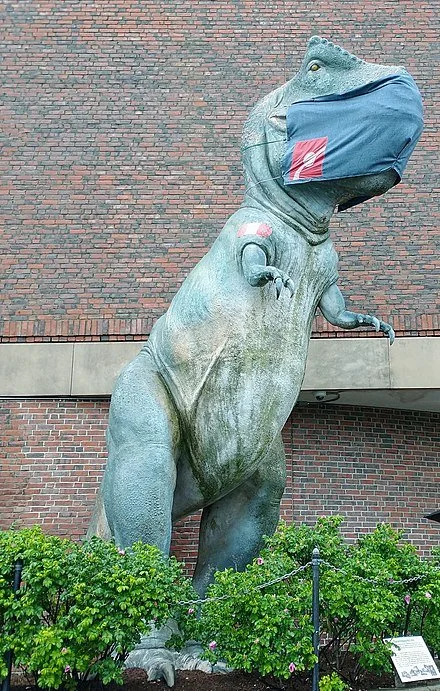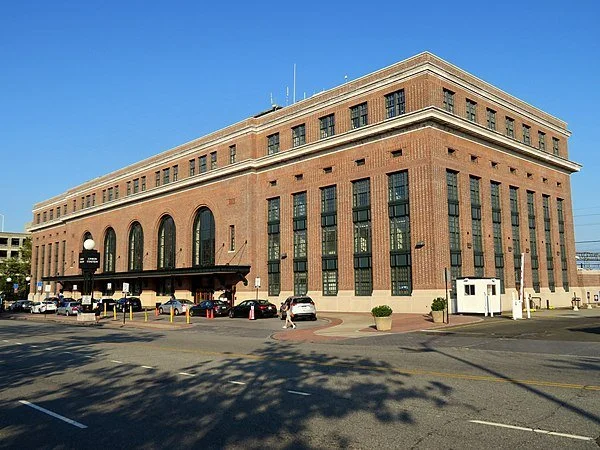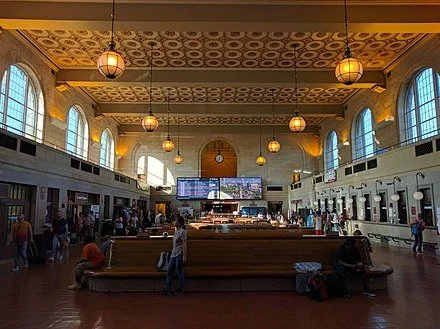
Chris Powell: Mask police do their thing as killers stay free; Spiffed up Union Station?
A Tyrannosaurus Rex sculpture outside Boston’s Museum of Science wearing a face mask and a Band-Aid indicating a COVID-19 vaccine has been administered.
MANCHESTER, Conn.
Poor New Haven. Its police department has been unable to make arrests in 35 of the 45 murders committed in the city in the last two years, a failure rate of 78 percent,.
Despite $111 million in federal emergency assistance, New Haven's school system is running a deficit again, constantly losing teachers to higher-paying school systems and unable to provide drinking water to students, having shut down the water fountains in school hallways in fear that the fountains contribute to the virus epidemic. While water bottle-filling stations have been ordered, they may not be installed before the next school year begins.
But elsewhere Mayor Justin Elicker's administration is on a tear of efficiency. Last week the city launched a sweep of local businesses to check compliance with the mayor's order that everyone indoors in commercial facilities must wear a face mask.
Face masks are doubtful mechanisms of curtailing the virus, but if everyone is required to wear a mask indoors, at least medical theater can make city government seem to be taking charge, distracting from its other failures. A problem will arise only if people start comparing risks.
For even before the arrival of the latest variant of the virus, Omicron, 99.8 percent of people infected recovered, and while Omicron is believed to be more communicable, in most cases it also appears to be far less severe, no worse than a cold and less deadly than, say, a bullet to the brain and the other causes of the criminal deaths New Haven can't solve.
But all Connecticut, not just New Haven, should be questioning government's priorities in the face of the city's many unsolved murders.
A few days ago Windsor's police department announced that after eight months of investigation, it remains unable to determine who, back in April, hung ropes resembling nooses at the Amazon warehouse under construction in that town. The ropes injured no one, but many people were eager to claim that they had felt threatened.
A Windsor police statement described the extensive efforts taken to solve the supposed crime: "Numerous interviews of Amazon construction site personnel were conducted, including steel workers, electricians, safety and security workers, and administrative personnel, as well as others not directly involved in the construction site. Investigators reviewed personnel records of multiple employees, camera footage, and shift logs." Some people were given polygraph tests.
Assisting the Windsor police were the FBI, state police, and Hartford state's attorney's office.
What if such federal and regional resources had been poured instead into investigating the 35 unsolved murders in New Haven? Might one or two of them have been solved by now?
Maybe not, but at least Connecticut would have been spared eight months of expensive political correctness.
Union Station in New Haven.
The still gorgeous interior of Union Station, a major stop and train-changing center for Amtrak and Metro North.
Last week there was also a hopeful development in New Haven. After years of failure to act on the huge potential of historic Union Station, the busiest and grandest railroad station in Connecticut, city government and the state Transportation Department signed a development agreement.
State government will lease the station and its adjacent property to the city for 35 years, with a possible extension of 20 years, so the city might improve it with much-needed parking, a bus depot, restaurants and retail shops, offices, a beautiful plaza, frequent shuttle bus service to Tweed New Haven Airport, and whatever else might befit this gateway to Connecticut and link it to downtown New Haven a half mile away -- if enough free money ever can be found from the state and federal governments, since the city never will have any of its own to spare.
It's a compelling idea but as the city's police and school disasters suggest, there's little reason to believe that New Haven is capable of executing it any more than Hartford has been capable of managing its own big development projects, which is why state government has put a state agency in charge of them. The same should have been done for the Union Station project in New Haven.
So it will be no surprise if the project takes 35 years just to get started, only to end up with marijuana dispensaries, methadone and abortion clinics, gambling parlors, still more housing for people who can't support themselves -- and still not enough parking.-
Chris Powell is a columnist for the Journal Inquirer, in Manchester.
Llewellyn King: Homelessness in America at crisis point
The British call it sleeping rough. We call it for what it is: homelessness.
It starts the day when all the support systems -- fragile as they often are -- fail. When there is no home to go to; no bed to sleep in, no meal to eat, no toilet to use, no place to wash even a face -- just the hard, cold and often wet streets that offer no succor. The hospitality of a concrete sidewalk is scant.
That is what faces 4 million luckless children each year in the United States, according to Renee Trincanello, chief executive officer of Covenant House Florida, which operates shelters in Ft. Lauderdale and Orlando. Once they hit the streets, they are vulnerable to every horror that can happen to a child, including sex trafficking. “They also are used by drug dealers to inculcate a habit,” Trincanello told me.
In the United States, homelessness is at a crisis point. Cities are clogged with the homeless from coast to coast. If you travel a lot, as I do, you are aware of how homelessness is at its most conspicuous where there is prosperity -- a byproduct of high rents in cities like San Francisco, Austin, New York and Boston.
Very close to the Capitol in Washington, around Union Station, the homeless sleep on the sidewalks, sometimes with the barest needs met by charities -- needs like a sleeping bag, if they have been identified and are lucky. Train stations are a mecca for the homeless because they have public toilets and offer warmth. But Union Station has removed most of its seating to keep out the homeless.
To draw attention to the misery and extreme danger of children sleeping in the streets, and to raise money, Covenant House branches in the United States, Canada and Latin America organize sleep outs. Once a year, executives like my friend Jan Vrins, managing director and leader of Navigant’s global energy practice, takes a sleeping bag, puts it on top of a cardboard box and gets a hard night’s rest on a parking lot pavement.
Vrins says, “It isn’t fun to sleep in a concrete parking lot on a carton box with a sleeping bag. But the time we spend with these youths before we sleep out is wonderful. First, we have dinner with them and have sessions where they share their stories.” Afterward, the children are safely tucked up in the shelter and the adults repair to the parking lot.
In every case, Vrins says, something has happened to them. “Their families have broken up, sometimes because of addiction; there have been storms, as in Puerto Rico, and they end up in the shelters. So, climate change is leading to more kids on the street,” he says.
Vrins says that he was introduced to Covenant House by an executive from Florida Power & Light. “That was 11 years ago, and I got hooked,” he says. Now he is Covenant House Florida’s vice chairman.
Trincanello, who is married with two daughters, has spent her career with Covenant House. She told me that her father wanted her to be a lawyer; she pushed back and became a social worker.
If you sign up to sleep out with Covenant House, whether it is in chilly Toronto or as, as Vrins notes, more benign Florida, you will join some of the cream of America’s executive talent from Accenture and Black Rock, to Cisco, KPMG and other companies. In fact, prominent companies field “teams.”
Vrins, who is married with two sons, heads the Navigant team. Each sleeper is expected to raise $1,000 for Covenant House. This year, he laid down on the concrete in Ft. Lauderdale on Nov. 26. He says 130 people slept out there and raised $270,000.
A native of the Netherlands, Vrins is one of those gregarious people who puts his arms around you with his smile. He speaks with passion and love of the homeless children in their crises. Trincanello, whom I have not met, has a voice as warm as a winter hearth. I can imagine it melting fear in a scared child. Together they do work which is not a molecule short of noble.
Vrins says of sleeping out: “When you wake up in the morning, you feel blessed. When homeless kids must look for the next place to spend the night, you feel blessed.”
Llewellyn King is executive producer and host of White House Chronicle, on PBS. He’s based in Rhode Island and Washington, D.C.
On Twitter: @llewellynking2
Look for a better owner of Worcester's Union Station
Worcester’s glorious Union Station should become increasingly important as more and more people seek to use mass transit. But it might be much better run if owned either by a private entity or by some new public-private entity, such as Amtrak, and not by its current owner, the Worcester Redevelopment Authority. At least the grossly underfunded Amtrak, which has never been more patronized than now, knows the transportation business. And the Northeast Corridor is Amtrak's big money maker.
Certainly the size and location of Worcester and the station’s size and beauty could make it into the nexus of interior southern New England. Consider such splendid company-owned venues for the public as Madison Square Garden.







